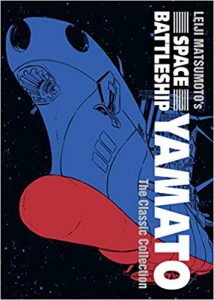By Michio Murakawa, originally written by Yoshinobu Nishizaki. Based on the series created by Leiji Matsumoto. Released in Japan as “Uchuu Senkan Yamato 2199” by Kadokawa Shoten, serialization ongoing in the magazine Newtype Ace. Released in North America by Dark Horse Comics. Translated by Zack Davisson.
I was very much of two minds about this modern reboot of the classic 70s space opera. On the one hand, it does everything that you’d want to have done in a retelling updating Matsumoto to the 21st century. The character development gains greater depth, there’s more room for the story to breathe, there are significant female characters (and some of them aren’t even blondes!). It’s pretty good. On the other hand, it does everything you’d expect to have done in a retelling as well. The relationship between Mori and Kodai reminds me of Ranma and Akane at times, and Mori reads far more like a tsundere than I’d really want. There’s also a lot of really gratuitous fanservice, including many, many ass shots of the female cast, and one bizarre moment when they go through warp that is supposed to show it’s a mental experience as well but also mostly shows off naked breasts for the crew. So it’s pretty good, but there are issues.
The basic plot is the same as the original. The Earth is under attack from the alien Gamilans, who have basically destroyed Earth. Fortunately another alien race, the Iscander, are offering hope for the ever-popular in SF faster-than-light drive. The trouble is getting there… and that’s why we have the Yamato and its motley crew (a bit less motley in this version as it’s not being drawn by Matsumoto). We’ve got Admiral Okita, who is as good as ever as being “top Naval commander”. We’ve got crack pilot Susumu Kodai and his best friend Daisuke Shima. We’ve got Yuki Mori, who gets off to a bad start with Kodai but also has “love interest” written all over her. But there’s also a bunch of new characters, most of the notable ones women. Niimi seems like “the smart one”, the nurse Harada, who serves as a combination of comedy relief, fanservice, and romantic shipper. There’s Yamamoto, another hotshot pilot sort. And there’s also the robot, though as of yet he’s not as fun as the original.
There are lots of nice shots of space and the Yamato traveling through it, though we don’t get pages and pages of it the way the original series did. Those pages are taken up by plot and characterization, and it’s up to the reader to determine if they make the remake better or worse. I’d say “different”. Certainly I do feel like continuing the story, and I love seeing these characters all over again. It just lacks the space opera grandeur of the original – it’s not as operatic as Matsumoto at his best. But it’s also a lot longer than the original manga, so we’ll see what direction it decides to take its story in the future.


